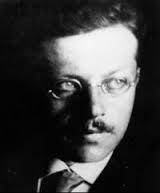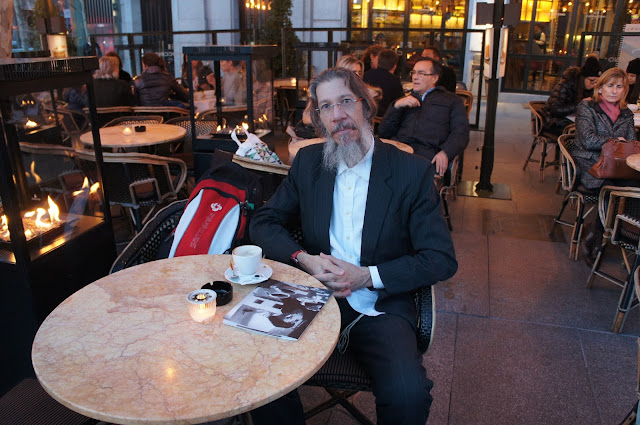JACOB JR, MY JEWISH WORLD. MARTIN BUBER AND FRANZ ROSENZWEIG
 |
| FRANZ ROSENZWEIG |
 |
| MARTIN BUBER |
Sunday, Kislev 4, 5777. December 4, 2016.
Shalom! World.
Mendelssohn and Cohen posits a confluence between Judaism and rationality in which Jews and Judaism would exist as a minority that would contribute to the majority culture.
Martin Buber (1878-1965) and Franz Rosenzweig (1886-1929) rejects what they deem overly apologetic arguments for a confluence between Judaism and modernity. Experience, and not rationality, they contend, is the basis of a Jewish life. While Buber underscores the centrality of the experience of dialogue between two people to the exclusion of Jewish law and ritual, Rosenzweig stresses the necessity of law and ritual.
The German Jewish thinkers: Mendelssohn, Geiger, Graetz, Cohen and Hirsch, were all didicated to a German notion of Bildung, which involved a commitment to self-improvement, rationality, and refinement. For Germans and German Jews alike, eastern European Jews represented the coarseness and vulgarity that life was the opposite of German culture.
Mendelssohn and Cohen were far more sympathetic to the plight of eastern European Jews than were many of their contemporaries. But their defense of their eastern coreligionists boiled down to their insistence that eastern European Jews could actually be civilezed if they were properly educated by German Jews. The first step, according to Mendelssohn, was for Jews to stop spaeking Yiddish and instead learn speak German properly. In order to help Jews learn German, Mendelssohn set out to translate the Torah into German. But the German of Mendelssohn's Torah translation was written with Hebrew characters so that Jews who did not know German could read it.
German Jews were nervous that for all their hard work at improving themselves and acquiring German culture, they would nonethless be assciated with their unrefined brethren. German Jews also depicted their eastern European brethren in negative terms because they sought to deemphasize any national aspect of the Jewish religion. Jews had been emancipated; Jewishness was not.
In stark contrast to previous German Jewish thinkers, Scholen, Kafka, Buber, and Rosenzweig all believed that it was German Jewry that could learn from eastern European Jewry, and not the other way around. The rejection of the notions of rationality and political progress by Scholem, Kafka, Buber, and Rosenzweig went hand in hand with their shared affirmation of what they regard as the authentic lived experience of eastern European Jews, who did not apologize for their Judaism or Jewishness of every individual has squirmed on the needle point of a "why". Kafka's interest in Yiddsh theater, Scholen's concern with Jewish mysticism, Rosenzweig's focus on what he saw as the organic character of Jewish communal life, and Buber's stress on Hasidism were all efforts to overcome the so-called success of German Jewish paradigm that left these intellectuals cultured and educated by German standars, but Jewishly ignorant and existentially lost.
Buber and Rosenzweig reject the question "Why be Jewish?" by emphasizing what each regards as the lived experience of Judaism. Rosenzweig grew up in an assimilated but proud Jewsih family. Judaism was not a live option for Rosenzweig. He immersed himself in the study of Judaism, and after what he described as a profound experience on Yom Kippur in 1913. During World War I, Rosenzweig served as a soldier for Germany, and in 1918, he found himself in first time, he was taken by what he saw as the vitality of their Jewish lives in comparison with the paucity of his own German Jewish experience. Unlike Rosenzweig, Buber received a solid Jewish education in his youth. Buber's mother abandoned him and his father when Buber was a child, and Buber was subsequently brought up in the home of his paternal grandfather, Solomon Buber (1827-1906), who was a well-known midrash scholar. But despite his upbringing, Buber grew increasingly alienated from any form of Judaism, and like so many of his contemporaries, became intellectually steeped in non-Jewsih studies. Yet also like so many of his contemporaries, Buber became increasingly disillusioned with the promises of German culture and politics. As a university student, he initially became interested in not Judaism but rather Zionism, which he characterized as !the restauration of the connection, the renewed taking root in community."
Buber contrasts two modes of experiencing the world: the "I-It" relation and the "I-Thou" relations. The I-It relation is an instrumental one in which a person treats another as an object to be used. I-It relations are of course necessary, for example, in the realm of science, where we manipulate the world for our own benefit. But while he ackknowledges that human life always exists within the realm of I-It relations. An I-Thou relationship exists for its own sake. Equally as important, the I and the Thou of the I-Thou relation exist only in relation to each other, which means that they define ech other. In an I-Thou relationship, therefore, it is not possible to separate the I from the Thou in a absolute sense.
For Buber, law by definition express an I-It relationship, because everyone is the same under the law, which means that each person is an object of the law. Buber maintains that the modern Jewish movements (reform, conservative and orthodox) are far more alike than they are different. Each movement understands Judaism in I-It terms: ethics for the reform movement, history for the positive-historical movement, and law for the orthodox movement.
About the Ten Commandments he said: "G'd has renounced this power of His sufficiently to let every individual actually decide for himself whether he wants to open or close his ears to the voice, and that means whether he wants to choose or rejects the of "I am."
For Buber, G'd is neither a lawgiver nor a enforcer of law. The Commandments represent, for him, the mark of a personal relationship that each individual has with the divine, in contrast to "an impersonal codex" (or code of law) that by definition treats all individuals the same under the law. In Buber's view, the Ten Commandments do not reflect G's power to enforce these laws but rather the relinquishment of power by G'd for the sake of human freedom to accept or reject G'd's presence.
The focus of Rosenzweig's thought is the shared encounter between G'd and the human being. In 1921 Rosenzwieg published a highly complex philosophical treatise titled The Star of Redemption, which asked and tried to answer the question of whether the experience of G'd's revelation was possible for the modern person. Star explores the limitations of some of the dominant trends of German philosophy and in particular German idealism, including Hegel's and Cohen's philosophies. Rosenzweig argues tha tidealism cannot acclount for death, language, or art. These limitations, he suggests, open up the possibility, and onlu the possibility, of divine revelation - an experience that can and does wholly transform the individual human being.
G'd describes revelation as commanding love. Rosenzweig begins his discussion of revelation in the Star by quoting the Song of Songs and then commenting:
Love is strong as death. Strong in the same way as death? But against whom does death display its strength? Against him whomm it seizes. And love, of course, seizes both, the lover as well as the beloved, but the beloved otherwise than the lover. It originates in the lover. The beloved is seized, his love is already a response to being seized.
Buber's and Rosenzweig's different views of divine authority extend to their different attitudes toward Zionism. Buber belived that the diaspora holds no future for the regeneration of the Jewish people; he therefore supports the Jewish return to Palestine. Rosenzweig rejects Zionism because he considers homelessness an intrinsic part of Jewsih life.
In stark contrast to previous German Jewish thinkers, Scholen, Kafka, Buber, and Rosenzweig all believed that it was German Jewry that could learn from eastern European Jewry, and not the other way around. The rejection of the notions of rationality and political progress by Scholem, Kafka, Buber, and Rosenzweig went hand in hand with their shared affirmation of what they regard as the authentic lived experience of eastern European Jews, who did not apologize for their Judaism or Jewishness of every individual has squirmed on the needle point of a "why". Kafka's interest in Yiddsh theater, Scholen's concern with Jewish mysticism, Rosenzweig's focus on what he saw as the organic character of Jewish communal life, and Buber's stress on Hasidism were all efforts to overcome the so-called success of German Jewish paradigm that left these intellectuals cultured and educated by German standars, but Jewishly ignorant and existentially lost.
Buber and Rosenzweig reject the question "Why be Jewish?" by emphasizing what each regards as the lived experience of Judaism. Rosenzweig grew up in an assimilated but proud Jewsih family. Judaism was not a live option for Rosenzweig. He immersed himself in the study of Judaism, and after what he described as a profound experience on Yom Kippur in 1913. During World War I, Rosenzweig served as a soldier for Germany, and in 1918, he found himself in first time, he was taken by what he saw as the vitality of their Jewish lives in comparison with the paucity of his own German Jewish experience. Unlike Rosenzweig, Buber received a solid Jewish education in his youth. Buber's mother abandoned him and his father when Buber was a child, and Buber was subsequently brought up in the home of his paternal grandfather, Solomon Buber (1827-1906), who was a well-known midrash scholar. But despite his upbringing, Buber grew increasingly alienated from any form of Judaism, and like so many of his contemporaries, became intellectually steeped in non-Jewsih studies. Yet also like so many of his contemporaries, Buber became increasingly disillusioned with the promises of German culture and politics. As a university student, he initially became interested in not Judaism but rather Zionism, which he characterized as !the restauration of the connection, the renewed taking root in community."
Buber contrasts two modes of experiencing the world: the "I-It" relation and the "I-Thou" relations. The I-It relation is an instrumental one in which a person treats another as an object to be used. I-It relations are of course necessary, for example, in the realm of science, where we manipulate the world for our own benefit. But while he ackknowledges that human life always exists within the realm of I-It relations. An I-Thou relationship exists for its own sake. Equally as important, the I and the Thou of the I-Thou relation exist only in relation to each other, which means that they define ech other. In an I-Thou relationship, therefore, it is not possible to separate the I from the Thou in a absolute sense.
For Buber, law by definition express an I-It relationship, because everyone is the same under the law, which means that each person is an object of the law. Buber maintains that the modern Jewish movements (reform, conservative and orthodox) are far more alike than they are different. Each movement understands Judaism in I-It terms: ethics for the reform movement, history for the positive-historical movement, and law for the orthodox movement.
About the Ten Commandments he said: "G'd has renounced this power of His sufficiently to let every individual actually decide for himself whether he wants to open or close his ears to the voice, and that means whether he wants to choose or rejects the of "I am."
For Buber, G'd is neither a lawgiver nor a enforcer of law. The Commandments represent, for him, the mark of a personal relationship that each individual has with the divine, in contrast to "an impersonal codex" (or code of law) that by definition treats all individuals the same under the law. In Buber's view, the Ten Commandments do not reflect G's power to enforce these laws but rather the relinquishment of power by G'd for the sake of human freedom to accept or reject G'd's presence.
The focus of Rosenzweig's thought is the shared encounter between G'd and the human being. In 1921 Rosenzwieg published a highly complex philosophical treatise titled The Star of Redemption, which asked and tried to answer the question of whether the experience of G'd's revelation was possible for the modern person. Star explores the limitations of some of the dominant trends of German philosophy and in particular German idealism, including Hegel's and Cohen's philosophies. Rosenzweig argues tha tidealism cannot acclount for death, language, or art. These limitations, he suggests, open up the possibility, and onlu the possibility, of divine revelation - an experience that can and does wholly transform the individual human being.
G'd describes revelation as commanding love. Rosenzweig begins his discussion of revelation in the Star by quoting the Song of Songs and then commenting:
Love is strong as death. Strong in the same way as death? But against whom does death display its strength? Against him whomm it seizes. And love, of course, seizes both, the lover as well as the beloved, but the beloved otherwise than the lover. It originates in the lover. The beloved is seized, his love is already a response to being seized.
Buber's and Rosenzweig's different views of divine authority extend to their different attitudes toward Zionism. Buber belived that the diaspora holds no future for the regeneration of the Jewish people; he therefore supports the Jewish return to Palestine. Rosenzweig rejects Zionism because he considers homelessness an intrinsic part of Jewsih life.
Shalom! Aleichem.
Suporte cultural: Jacob Jr. B.A.C.E., avec L'Integration d'Association avec Israel et dans le Monde/Cz.



This is a really informative knowledge, Thanks for posting this informative Information. Mark Rosenzweig
ReplyDelete